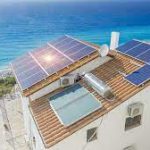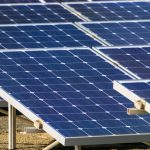
1 MW Solar Power Plant Cost in India
Too much consumption of electricity? Well, what could be a better replacement than a solar panel? A photovoltaic module is an assembly of photovoltaic cells mounted in a framework for installation. Solar panels use sunlight as a source of energy and generate direct current electricity. A collection of PV modules is called a PV Panel, and a system of Panels is an Array. Here, Solar Company in Chandigarh will provide you with the latest information on 1 MW Solar Power Plant Cost in India.
Table of Contents
Types of Solar Plant:
1. On Grid:
Today, grid-tied systems are the most common type of photovoltaic system. A grid-tied system will allow you to save more money with solar panels through better efficiency rates, net metering, plus lower equipment and installation costs. Often, solar panels will generate more electricity than what one is capable of consuming. With net metering, the users can put this excess electricity onto the utility grid instead of storing it themselves with batteries. Net metering plays a vital role in how solar power is incentivized. Without it, the solar systems would be much less feasible from a financial point of view. The utility grid acts as a virtual battery without maintenance or replacements and with much better efficiency rates. Grid-tied systems do not protect from power cuts. When the electrical grid fails, grid-tied systems will not continue to operate. This allows utility employees to fix the power lines safely without wasting time identifying solar energy systems that are still feeding electricity into the power lines.
2. Off-Grid:
An off-grid solar system provides electricity at all times. To ensure this, an off-grid solar system requires battery storage and an inverter. The addition of an inverter allows the system to convert DC (Direct Current) coming from the batteries into AC (Alternating Current). The battery systems conventionally used have to be replaced after 10 years. They are complicated, expensive, and decrease overall system efficiency. Therefore, we have shifted to the use of our OEM battery systems Li-Rack, which uses Lithium technology.
3. Hybrid:
When choosing a solar power system, most households and businesses choose either a grid-connected or an off-grid system. But there’s a third option. A hybrid solar system combines the best of both worlds: the convenience of a grid-connected system — including the ability to earn from the Net Metering— with the extra peace of mind of a battery backup. This means that even during a power blackout, you still have electricity. “NO BLACKOUTS EVER” Combining energy storage with a grid connection to your property, hybrid systems can provide the flexibility of being able to store the energy you generate during the day instead of feeding it back into the grid – typically at a low feed-in tariff. This energy can be used in the evening instead of repurchasing power at a higher price.
1 MW Solar Power Plant Cost in India:
The solar power investment model is here. You can refer to the rates and look in for more information. The demand for unpolluted energy in India is great.
| Capacity of Power Plant | 1 MW |
| Generation per Year | 17.50 Lakh |
| Degradation 1 to 10 year | 0.05% |
| Degradation 11 to 25 year | 0.67% |
| Debt Percentage | 70% |
| Equity Percentage | 30% |
| Rate of Interest (Indian) | 13.0% |
| Rate of Interest (Foreign) | 10% |
| Repayment Period (Indian) | 11 years |
| Repayment Period (Foreign) | 15 years |
| Percentage of Indian Loan | 70% |
| Sale of Electricity | Rs. 6.49 |
| Cost of Project per MW | 450 Lakh |
| O&M Cost per MW | 8 Lakh/year |
| Depreciation | 5.28% |
| Corporate Tax | 30.28% |
| Minimum Alternate Tax | 18.38% |
| Project Cost | 450 Lakh |
| Debt | 355 Lakh |
| Equity | 95 Lakh |
1 MW Solar Plant Balance Sheet:
| INCOME | AMOUNT | EXPENDITURE | AMOUNT | |
| Total Revenue for 10 years | 113,300,000 | Operational Expenses | 8,000,000 | |
| Bank Interest Payment | 33,000,000 | |||
| Depreciation | 34,300,000 | |||
| Total Expense (without AD) | 75,300,000 | |||
| Profit Before Tax (without AD) | 38,000,000 | |||
| Taxation (without AD) | 7,230,000 | |||
| (Min Alternative Tax 19%) | ||||
| Profit After Tax (Without AD) | 30,770,000 | |||
| Total Income | 113,300,000 | 113,300,000 |
| Depreciation | 34,300,000 |
| Profit After Tax (Without AD) | 30,770,000 |
| Total amount in account | 65,070,000 |
| Bank Debt Amount | 41,300,000 |
| Balance cash in hand | 23,770,000 |
Scope of Solar Power in India
Nowadays, India starts switching to solar power. That’s one of the simplest financial decisions in today’s world. As we will see, the costs of fossil and fuels are increasing day by day, so this is often an ideal alternative to this problem. Although India has vast scope within solar energy, because solar power for homes and industries is an inexpensive source of unpolluted energy, it’s available widely across the country with no interruption. Contact Urban Solarise – the best Solar Company in Chandigarh you will ever find.
Must Read Blogs:










